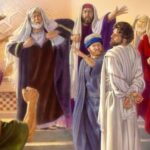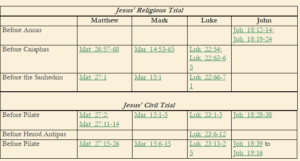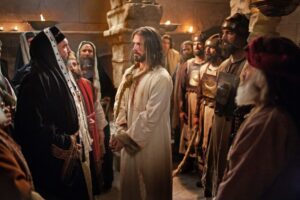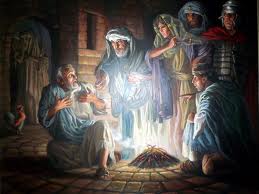 John 18 – The Trials of Jesus
John 18 – The Trials of Jesus
The world has known many tragedies that span the scope of all humanity. Beyond the fall into sin in the Garden, there have been innumerable human tragedies such as the Flood, Sodom and Gomorrah, military conflicts in many different times and cultures, and other human failures that have spread their evil around the world. We also know that according to God’s Word there is a final tragedy for mankind, the judgment of God on every person who ever lived on Earth for his sinful rebellion,  removing sin from God’s creation permanently. Until that happens, we know that the human struggle under sin will continue. Within that context, we look now in this study at history’s greatest tragedy, the death of Jesus Christ on the Cross.
removing sin from God’s creation permanently. Until that happens, we know that the human struggle under sin will continue. Within that context, we look now in this study at history’s greatest tragedy, the death of Jesus Christ on the Cross.
The travesty of justice that were conspired and executed in the events reported in John 18-19 is despicable if not mind-boggling. Such hateful vengeance on one extreme compared to the holy character of the One being charged. The Jewish leaders and the Roman government conspired to rid themselves of this irritating Man Who referred to Himself as God’s Messiah. Nothing we write here can add to the substantial writers who have expressed in great depth and emotion what a tragedy it was for fallen man, in his insolence, to position himself in such a way that he could condemn the Son of God and inflict such great inhuman suffering on Him. It was indeed a dark day for humanity as Christ hung on that Cross. It was only by the grace and power of God that Christ succumbed to death, took on Himself the punishment for our sins, and provided a way of escape by His resurrection so that each of us could place our faith in the finished work of Christ on the Cross and rejoice in being made new creations in Christ.
As we approach these sad events, we need to hold tightly to the confidence we have in Christ as our Savior. We understand that God planned for these events before time began. When Adam succumbed to Satan’s temptation and fell into sinful rebellion, God promised (Gen. 3:15) to provide a Redeemer. After more than 4000 years of human history, His Son came to Earth and endured the slander and punishment knowing according to Hebrews 12:1 that He had the prospect in front of Him of great joy because of what was being accomplished. “Fixing our eyes on Jesus, the author and perfecter of faith, who for the joy set before Him endured the cross, despising the shame, and has sat down at the right hand of the throne of God.” Heb. 12:1
![]() Bible Study Journal
Bible Study Journal
Read John 18:1-11 and make notes on how Jesus demonstrated being in control of these events.

John 18:1 – “These words…” 
John is likely referring to the teaching that Jesus had been sharing with His disciples during the Upper Room Discourse. Now they have left that special place and walked together out of Jerusalem, down into the Kidron valley and back up onto the Mount of Olives and to the Garden of Gethsemane. John notes that this is where Jesus is arrested, but doesn’t mention His praying there as the other Gospels do. It is clear that Jesus deliberately went to the exact place where the arrest was to occur. Judas knew that the area was preferred by Jesus for times to get alone with the Father when confrontations in Jerusalem increased.
Jesus had already been explaining to His men that these things would happen (3:14; 8:28; 12:34). Now the end had begun – Jesus is willingly surrendered for arrest, the Jewish leaders’ conspiracy to be rid of Jesus would be accomplished. The quiet private time with Jesus in the Garden is broken by the intrusion of a crowd of hundreds carrying torches and weapons, figuring that Jesus will intend to avoid arrest. When they encounter His humble presence, it is almost as if they knew He was the One Who was controlling events and allowing things to proceed. Jesus “knew all things” (18:4), His omniscience guides His completion of His Father’s mission (Jn. 4:34; 5:30; 6:38). When He responded to their inquiry with “I am He”, they fell back, temporarily humbled by His authoritative presence, He actually had to repeat their question, “whom do you seek?” Peter’s aborted attempt to “protect” Jesus served only to underscore the complete control of the Messiah of the proceedings.
The Religious “Trials”
The arresting officials led Jesus to the residence of Annas and Caiaphas for the first of the trials, three appearances before the religious leaders followed by three appearances before the legal authorities. Consider this chart which shows how each of the Gospels covers the trials.

Annas is the senior elder and defacto highest voice of Jewish law and had the first audience with the Son of God. These trials are somewhat of a sham since the whole process has a conclusion already to by all parties. The religious trials made no effort to present convicting evidence. The attackers were committed to declaring their accusations and getting Jesus to acknowledge His guilt. The Jewish leaders were blinded with jealousy for the popularity Jesus had with people which enraged their rebellion against Him.
![]() Bible Study Journal
Bible Study Journal
Look up these verses for more insight on the Jews hatred of Jesus:
John 11:47-48; 12:11, 19, 42, 43; 7:32
The leaders had hoped they could contrive a charge against Jesus that would be accepted by Roman authorities as warrant to proceed with putting Him to death. High Priest Annas attempted to portray Jesus as being on trial for His teaching, but he already knew what Jesus taught and was aware that after several attempts before the arrest, he couldn’t prove that any of Jesus’ teach was wrong. Remember that Caiaphas was the one who had unknowingly prophesied Jesus’ sacrificial death to the Sanhedrin (John 11:50). He was the most powerful religious leader in Israel and he couldn’t prove any guilt in Jesus.
Annas gave up trying to get Jesus to admit guilt and he sent Jesus to appear before Caiaphas, his son-in-law and current High Priest. Like the other Gospels, the sequence of events between these religious proceedings and Peter’s denials are alternated.
Note that John doesn’t cover Jesus’ appearance before Caiaphas or the Sanhedrin (refer to the chart above). The other Gospel records had already been available for several years and perhaps John considered their coverage as adequate on those events. John’s goal was always to elevate the mission of the Messiah, the Son of God, and the words spoken by Jesus before Annas express that superior position.
Peter’s Denials of Jesus – John 18:15-18, 25-27
While Jesus was before Caiaphas and Annas, Peter had found himself outside of the residence staying warm around a campfire with a few others. Interesting that Jesus and Peter were both being interrogated at the same time. Peter was in a very low period in his spiritual life , but we still we ask: How did he come to this low point? The Bible tells us we will encounter trials and temptation as Christians (1 Cor. 10:13; James 1:2, 14-15). While external circumstances can be the primary factor, we also know that we sometimes allow an internal weakness to influence us – self-confidence, prayerlessness, independence. We have to be alert or we’ll end up right there with Peter. He hit a wall of failure and took a hard fall, he realized he wasn’t prepared to face the persecution and persecution that Jesus was facing. Jesus had predicted this to happen (Matt. 26:34), but Peter wasn’t adequately prepared to stand for Christ.
, but we still we ask: How did he come to this low point? The Bible tells us we will encounter trials and temptation as Christians (1 Cor. 10:13; James 1:2, 14-15). While external circumstances can be the primary factor, we also know that we sometimes allow an internal weakness to influence us – self-confidence, prayerlessness, independence. We have to be alert or we’ll end up right there with Peter. He hit a wall of failure and took a hard fall, he realized he wasn’t prepared to face the persecution and persecution that Jesus was facing. Jesus had predicted this to happen (Matt. 26:34), but Peter wasn’t adequately prepared to stand for Christ.
Who – ME?? Peter’s three denials:
- 1 – John 18:17, “I am not one of His disciples!” He was with “another disciples” (18:15), perhaps John, maybe he knew a relative that was connected to the Caiaphas’ court. This would have been another incident of special connection between these two special disciples. But Peter wasn’t with John, he was with these other unknown “street-wise” people – he was walking with the ungodly as we are advised against in Psalm 1:1. He walked into the courtyard with them, walking right into temptation, stood by the fire with them, and remained in their midst.
- 2 – John 18:25, “I am not…” again! This may have coincided with the conclusion of Annas’ trial.
- 3 – John 18:26, the strongest, most emotional, crude words (Matt. 26:75; Mk. 4:72; Lu. 22:62). And then, as Jesus predicted so sadly, the rooster crowed (Matt. 26:34). Luke tells us (22:61) that Jesus looked over at Peter in that moment, possibly as He was being led into Caiaphas’ court. The other Gospels report that Peter went out and wept bitterly (Matt. 26:75), as we can only imagine. John, Peter’s close companion, might have not wanted to close this account with that picture.
Peter’s failure and denial cut deeply into his soul. He knew Jesus would be broken-hearted. While Peter did continue to stand with the other disciples in the following days, it can only be imagined how horribly he suffered for this tremendous disloyalty to the Savior. In all the appearances Jesus made after the Resurrection, Peter must have been struggling. Then in John 21, Jesus singles Peter out for a conversation of restoration and challenge to ministry that demonstrates the depth of Jesus’ forgiving heart. Note also Jesus encouraging words to Peter in Luke 22:32, “I have prayed for you, that your faith may not fail; and you, when once you have turned again, strengthen your brothers.” Peter lived the rest of his life encouraging and strengthening his fellow Christians, continuing on in to our lives as well – read 1 & 2 Peter to see why!
![]() Bible Study Journal
Bible Study Journal
-
-
-
-
- Being a Christian doesn’t guarantee us against experiencing failure. What should a Christian do when he fails in his faith?
- Consider what these verses say: Job 14:1; Heb. 12:1-2; Phil. 4:11-13
- What reasons might Peter have had for saying and doing what he did?
-
-
-
The Political Trials – John 18:28-19:16
John tells us more than the other Gospels about Jesus and Pilate. From all the parts of the trials, John’s focus is on the interrogation by Pilate and he gives the account with an emphasis on Jesus’ authority (note Jn. 18:36; 19:11, 14). Jesus is led into the “Praetorium”, Pilate’s Jerusalem residence where he presides for matters of state. The Jewish leaders didn’t go in because they wanted to stay ceremonially clean for the Passover. While the Passover feast itself was held Thursday evening, the Passover Festival would end with the Feast of Unleavened Bread on the upcoming Sabbath. Pilate was an evil dictator, crucified over 50,000 Jews. His political power would mean that he all the “intelligence” he needed about this renegade standing before him.
As Jesus stands before Pilate, He is regal. Pilate spuriously asked in 18:33, “So, are you King of the Jews?” Jesus’ response causes Pilate to look inside. Matt. 27:11 tells us that Jesus responded with “It is as you say.” But then He turns the table with His own question, “Is this your own desire to know, or the words of others?” Pilate needed to recognize his own need for truth about Jesus. In 18:36, Jesus proceeds respond kindly to Pilate about Who He is. He is a king, but His kingdom is spiritual. So, then Pilate wants to assume Jesus isn’t a king – but Jesus clarifies in 18:37 that His kingdom is built on Truth. Pilate’s classic response, “What it truth?”, led him to end his questioning.
18:31 – The Jews are Cornered – they have to get Rome’s agreement to kill Jesus. Their issue with Jesus was His claim to be God, to claim God as His Father, that He was God’s Messiah. The Romans had no interest in their religious concerns. One last time, the Jewish leaders hit against the wall of God’s sovereignty.
18:36 – His Kingdom is not of this world. Jesus never expected to be a king on the Earth. Interesting to think how God’s plan leads to a new kingdom not of this world, and note how premillennial doctrine demonstrates the continuity and completeness of that plan.
18:38 – In the relative privacy of his private hall (v.33), Pilate interacts with Jesus in more conversation, and Jesus responds with openness about His message. Pilate exerts his power but has no impact on Jesus, yet Jesus’ words strike terror in Pilate’s heart – “you would have no authority over Me unless…” But Pilate turns on Jesus’ statement that He was declaring Truth to the people. Pilate refuses to bow to the God of Heaven and “the” Absolute Truth, instead relegating truth to an undefinable concept, nothing can be absolute. The sad reality is that if a person disposes of the One True God’s absolute truth, the only thing left is the person’s own self, which will fail in the end.
18:39 – Somewhere at this point in the sequence of events, Pilate sends Jesus to appear before Herod. Read more about that in Lu. 23, as noted in the chart above. But after that appearance, He comes back before Pilate. Pilate has apparently decides on his preferred scheme – he will declare Jesus guilty, but then release Him. As he announces that to the crowd they reacts angrily, and they demand that he free Barabbas instead and crucify Jesus. The die is cast.
The Final Gavel – 19:1-16

The Second trial with Pilate proceeds after Jesus is tortured by flogging. Pilate was under pressure to satisfy both his
Roman superiors, and the powerful Jewish leaders. Although Pilate may have hoped the people would be satisfied, he was confronted with demand. The Jews were now in “now or nothing” mode. Time was fleeting, it was almost noon and crucifixion must be over by nightfall!
Pilate declares “Behold the man!”, probably a gesture of disdain for the bloodied and humiliated man who stood before the people. Yet recall Zech. 6:12, where the prophet says to behold this Man Who is the Branch Who will bring about the future glorious kingdom of God. Yet the crowd would have none of that, yelling “Crucify Him!” – and they delivered Him to be crucified.




